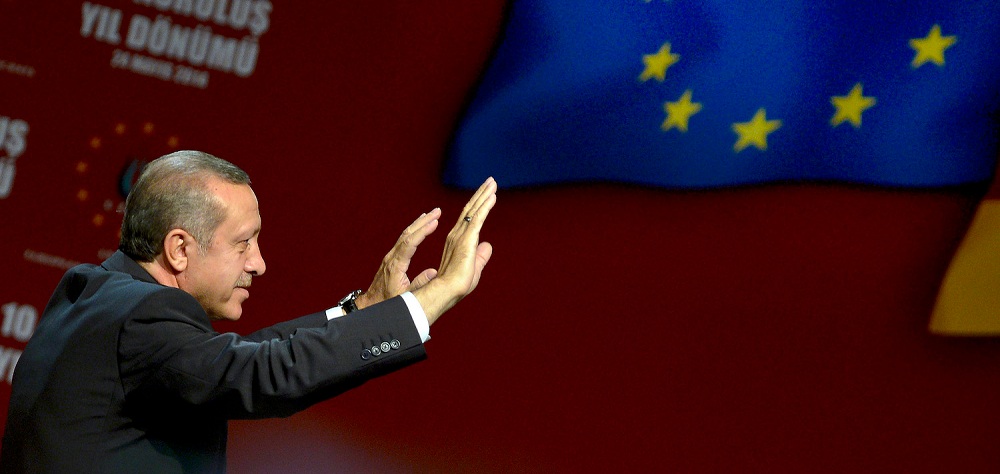Alwaght- After a period of tensions between Turkey and Europe over Ankara’s plans in the Mediterranean Sea, it seems that Brussels is losing patience and after verbal threats it is seeking practical steps to stop Turkish actions there.
To this end, members of the European Parliament approved a non-binding resolution sanctioning Turkey for its moves in Northern Cyprus and President Recep Tayyip Erdogan’s visit to the disputed region.
The resolution, approved by 631 affirmative votes against 59 abstentions, argues that Turkey has taken many “illegal” actions in the Mediterranean near Cyprus.
While the competition over undersea resources has heated up between Turkey on the one hand and Cyprus, Egypt, and the Israeli regime on the other hand, the European Union is throwing its weight behind the rivals of Ankara. At a meeting of the European leaders in October, Turkey was warned to refrain from exploration and production of hydrocarbons in the “territorial waters of Cyprus.” The closing statement of the meeting of the 27-state bloc threatened to slap Turkey with sanctions if it does not stop its energy explorations in the region.
A day after the warning, Turkey deployed another research ship to the region, a move motivating Germany, a country recently mediating between Turkey and Greece, to join France in its pro-sanctions approach towards Turkey. Last week’s inspection of a Turkish commercial vessel en route to Libya by a German naval strike group marked a warning shot to Ankara.
De-escalation of tensions with promises of reforms
Last week, Erdogan took a soft tone regarding the EU in a bid to de-escalate the verbal clashes with the European leaders. He said Turkey sees itself “nowhere else but in Europe”, and that Ankara seeks stronger cooperation with allies.
“We see ourselves nowhere else but in Europe. We contemplate to build our future together with Europe,” Erdogan told his governing Justice and Development (AK) party’s regular provincial congresses on Saturday.
In a bid to patch up relations, Erdogan dispatched his spokesman, Ibrahim Kalin, who often takes a role in foreign affairs, to Brussels on Friday.
Along with messages carrying Turkey’s readiness to sit on the negotiating table with Europeans and Kalin’s discussions in Brussels, the Turkish leader promised economic and political reforms which seem to be another effort by the president to de-escalate and stop the European drift towards anti-Turkish sanctions, especially that in the US, Joe Biden is replacing Donald Trump and the new administration at the White House is very likely to side with Europe in the disputes, mainly human and minority rights, with Ankara.
Ankara is very well aware that the differences with Europe are not limited to geopolitical matters and extend to democracy, rights, and politics. This was very much clear in comments made by Erdogan government’s officials on the goals of the promised reforms. Mehmat Ehsan Arslan, an advisor to Erdogan, told the BBC Turkish service “ reforms have been a challenge in our politics, to date. This is an confession.” Also, last week Abdelhamit Gül, Turkish justice minister, proposed revision of detention law that has already made thousands of opposition members end up in prison.
EU rejects Erdogan
On Thursday, the Turkish parliament approved a law bringing back to home national energy and mining companies with cross-border activity, seemingly to cut impacts of the European sanctions. This law means that Europe takes seriously the threats made by Europe, as Erdogan’s message of openness to dialogue failed to draw a positive response from the EU and the European Parliament approved the sanctions plan. Turkish-European tensions in the recent years have unprecedentedly deepened.
When French President Emmanuel Macron in November 2019 said NATO was experiencing “brain death”, he gave as an example the Turkish inconsonance with the West. Turkey-NATO differences on such cases as Syria crisis, Libya war, cooperation with Russia, and the Karabakh dispute have not subsided and the two sides show no signs of willingness to walk back from their stances.
Turkey says it would not give in to Western pressures to return the Russian S-400 air defense systems or leave them unused and Erdogan recently visited the uninhabited Maras city in Northern Cyprus, triggering reactions from Europe.
On November 25, the French Senate voted 305 to 1 to adopt a resolution, calling for recognition of the Republic of Artsakh by France, to stir Turkish anger.
Now that Ankara has strongly rejected the recommendations of the general assembly of the European Parliament on the Turkish Republic of Northern Cyprus (TRNC), we should see if in the upcoming weeks Brussels pressures will soften Erdogan’s stance and force him review his Mediterranean and Cyprus measures.



























